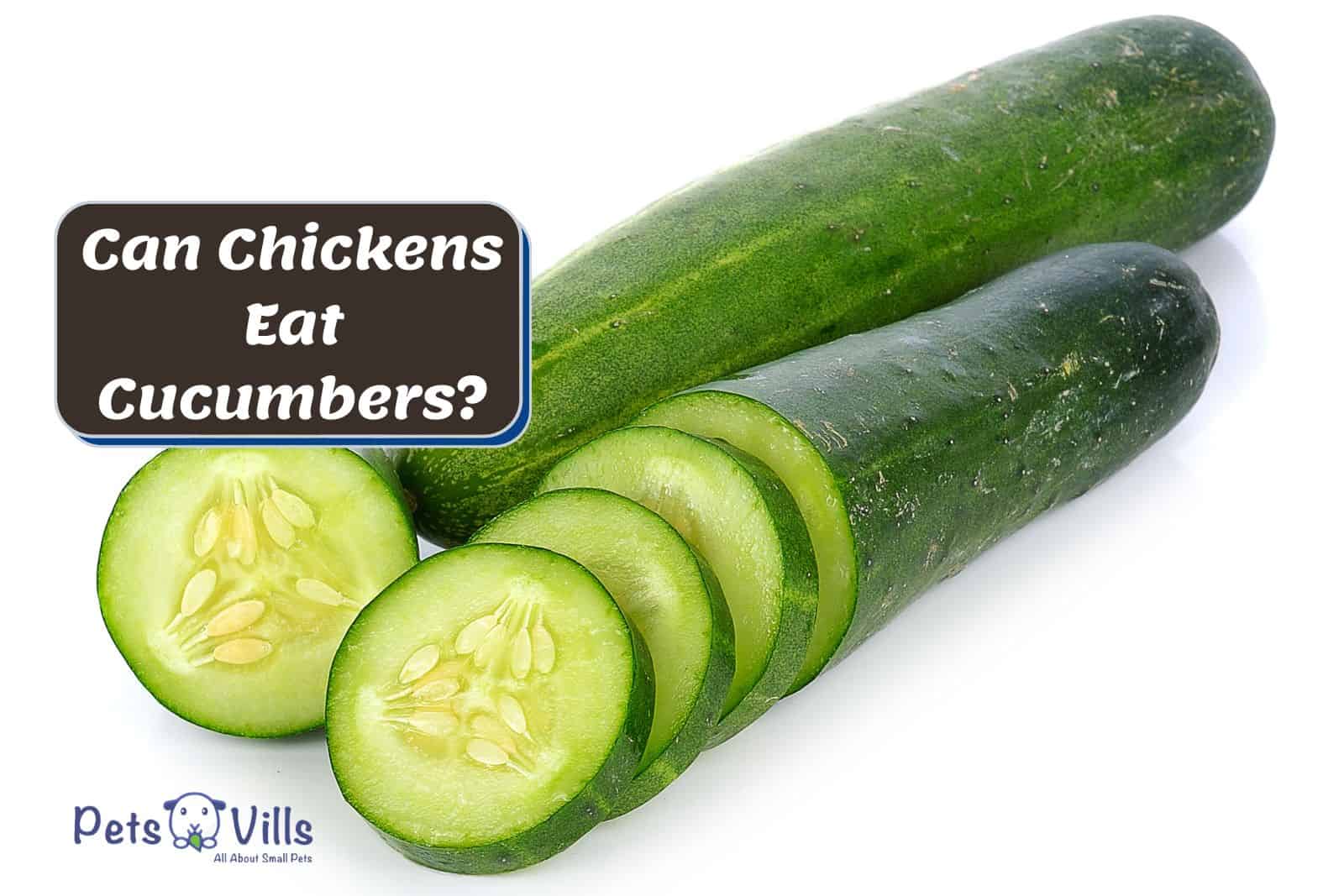Are you curious, “Can chickens eat cucumbers?”
Once, my chicks got crazy for cucumbers, and I was relieved to discover that chickens can eat cucumbers because they are non-toxic to domestic birds and a great source of nutrition.
But since providing a well-balanced diet is vital for your chicks’ health, there are a couple of things to know about feeding chickens cucumbers.
And I’m here to share them with you, so keep reading.
Table of Contents
Quick Summary
- Cucumbers and their leaves, peel, and seeds are a healthy snack for chickens because of their high nutrient content.
- Always feed cucumbers in moderation to avoid spoiling your chicks and interfering with their egg production.
- Opt for fresh and organic cucumbers to ensure your flock’s optimal health.
Should You Feed Cucumbers to Chickens?
Can chickens eat cucumbers? Yes, chickens can eat cucumbers, and fresh cucumbers are a great healthy treat for chickens because of their nutrients and high water content.
Cucumbers are a popular vegetable sold in grocery stores all year round. Also, you’d rarely find a garden without a cucumber patch during the warmer months.
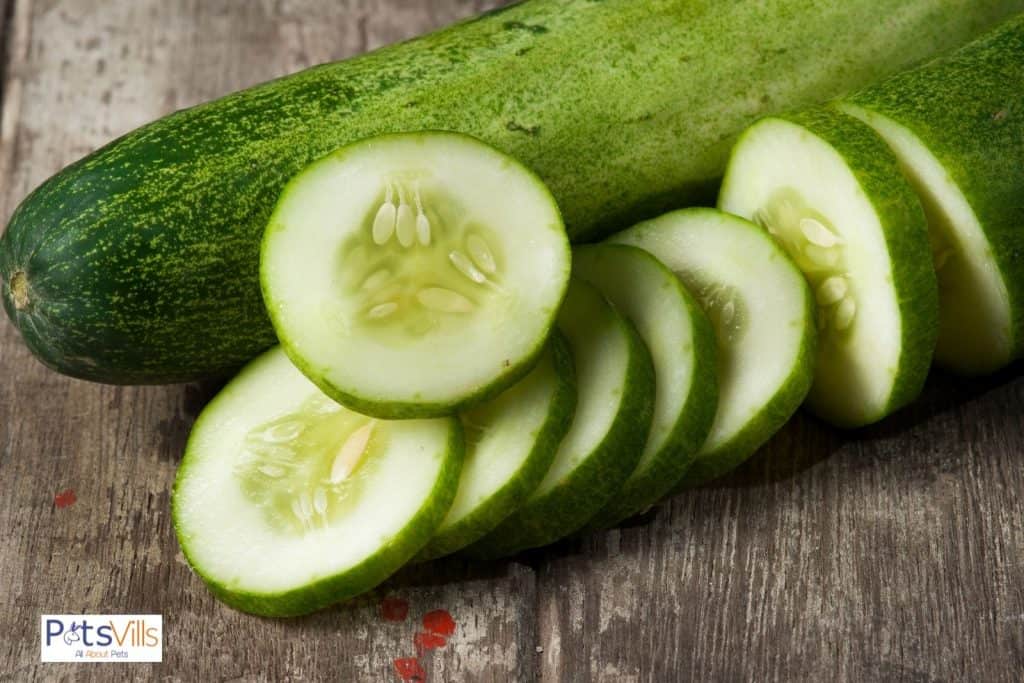
And that’s not surprising because cucumbers are tasty and have a lot of health benefits. But how safe are cucumbers for chickens?
Chickens aren’t picky, so they’ll try almost any fruit or veggie, even those dangerous for them, such as green tomatoes, avocadoes, or raw beans.
Fortunately, cucumbers are mainly made of water and don’t have any toxic chemicals or substances that can make your chicken ill.
Moreover, as you can see from this short video, chickens like this veggie.
Baby cucumbers (mini-cucumbers) are also a suitable healthy treat for chickens. Even pickles are an acceptable treat, but only in moderation.
More about the health benefits of feeding chickens in a bit. First, let’s talk about if you should give your chickens cucumber leaves, cucumber skin, or seeds.
Can Chickens Eat Cucumber Leaves?
Cucumber leaves are relatively safe for chickens to eat. However, you should feed them in moderation because cucumber leaves have emetic properties, meaning they can induce vomiting.
The good news is that chickens rarely consume so many leaves as to cause vomiting. But your chicks’ daily diet should consist mainly of chicken feed, so leaves should be an occasional treat.
When feeding leaves, follow these tips:
- Use leaves from young plants. These are edible and easy for chickens to eat. Older cucumber plants have tough cucumber leaves, which are not easily digestible.
- You can cut the leaves into smaller pieces so the chickens can eat them. If you try to place the whole cucumber leaves on their feed, they may ignore it.
- Ensure the leaves come from plants not treated with chemicals or pesticides, or your flock can get sick from secondary exposure.
- Cucumber vines are also safe for chickens to eat, but most chicks will ignore them because they’re far too thick and tough to peck.
- Remove any leftovers or moldy food from your chicken coop.
And now, let’s talk about cucumber peels and birds.
Can Chickens Eat Cucumber Peels?
Cucumber peels are non-toxic, and you don’t have to bake or cook them to remove toxins (unlike green potato skins that contain the toxin solanine).
However, peels are harsh to peck, so it’s not unusual to find leftovers in the coop. To make it easy for chickens, I usually tie the peels with string so they can munch as much as they want.
And don’t forget to wash the peels. Producers often treat fruits and veggies with pesticides, which are dangerous for humans and birds.
Can Chickens Eat Cucumber Seeds?
Cucumber seeds are relatively safe for birds and people. They’re rich in beta-carotene, vital for a robust immune system and healthy skin/feathers.
Still, it would be best if you didn’t give seeds in large amounts because of cucurbitacin, which has diuretic properties and can cause excessive fluid discharge.
So, chickens can eat all parts of the cucumber plant. But should you give this healthy treat to a baby chick? You’d be surprised.
Should You Feed Baby Chickens Cucumbers?
Baby chicks have delicate digestive systems; you shouldn’t overwhelm them with treats until they’re at least 1-2 months old.
For the first few weeks, baby chicks need high-quality chicken feed as their primary source of protein. Some owners also mix hard-boiled eggs and oatmeal as alternatives to commercial feed.
It’s vital to provide a balanced diet to avoid protein deficiency and ensure a healthy digestive system, robust immune system, and healthy feathers.
Once your baby chicks are old enough, they can eat cucumbers, bananas, carrots, raspberries, and other fresh fruits and veggies.
And now, let’s see what makes cucumbers a popular healthy snack for people and domestic birds alike.
Are you curious about whether it’s safe to feed your chickens mango skin or honey? Our articles “Can Chickens Eat Mango Skin?” and “Can Chickens Eat Honey?” explore these questions in detail, providing you with all the information you need to make informed decisions about your chickens’ diet. Don’t miss out on these valuable insights!
Health Benefits of Cucumber for Chickens
Cucumbers are an excellent source of vitamins, minerals, and antioxidants. They’re also a refreshing snack for hot summer days due to their high water content.
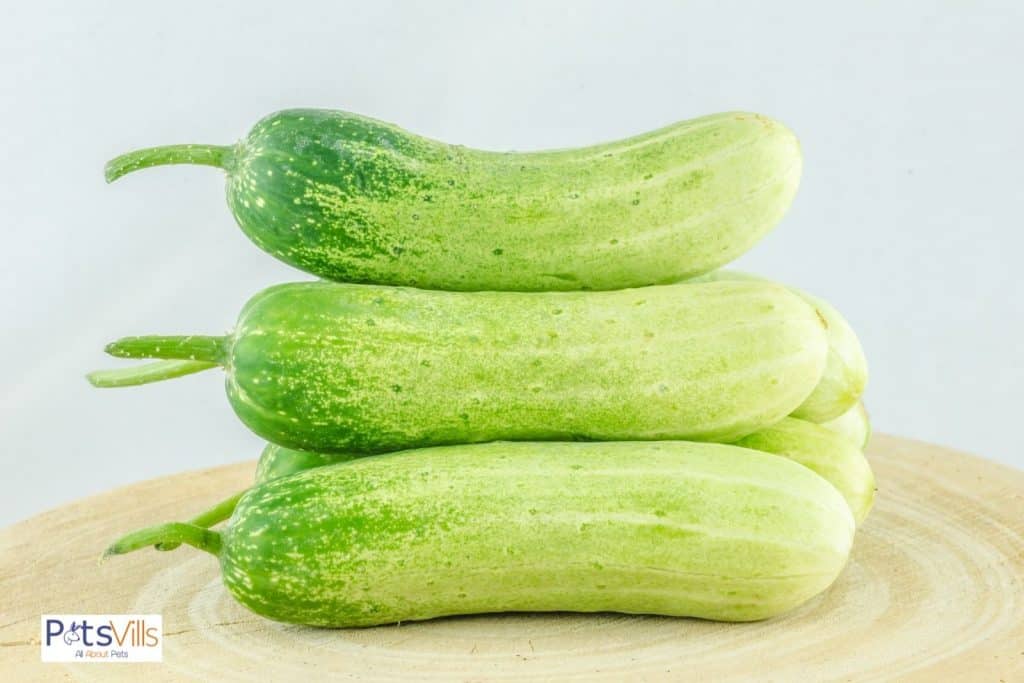
But let’s see in detail what nutrients they contain and how they affect your chick’s health.
Nutrition Facts about Cucumbers
According to the USDA, one 100-g cup of unpared, raw, chopped cucumber contains the following nutrients: (1)
- Water: 95.9 g
- Calories: 15
- Protein: 0.62 g
- Fat: 0.18 g
- Fiber: 0.7 g
- Calcium: 16 mg
- Iron: 0.25 mg
- Magnesium: 10.1 mg
- Phosphorus: 23 mg
- Potassium: 170 mg
- Sodium: 2 mg
- Vitamin C: 3.2 mg
- Folate: 14 mcg
- Beta carotene: 31 mcg
- Vitamin K: 7.2 mcg
5 Benefits of Feeding Cucumbers to Chickens
Cucumbers are not only rich in water, but they’re low in calories, sugars, and fat. And they’re an eggcellent source of fiber, calcium, antioxidants, and essential nutrients. And that’s not all.
#1 Better Hydration
Do you know how much water chickens drink per day? According to specialists from RSPCA, “Chickens need a constant supply of fresh water, they drink between 500 ml to 1 L of water per day.” (2)
Without water, chickens could die within 48 hrs. It could be even sooner if the temperature is extremely hot and you forget to refill the water bowls.
Fortunately, cucumbers can help you keep your flock hydrated. According to the National Institutes of Health, cucumber comprises about 96% water. (3)
So, this seedy veggie promotes hydration and can prevent your chicks from dehydrating during the hot summer months.
#2 High Antioxidant content
Cucumbers contain Vitamin C and Vitamin K, and both are potent antioxidants. They protect the cells against damage from free radicals and can strengthen the immune system.
Antioxidants can also prevent damage to the major organs and systems of the chickens, reduce stress, and promote egg-laying.
#3 Healthy Digestive System
Commercial feed is rich in protein. And while protein is excellent for your chicken’s health, too much can cause constipation. And not drinking enough water also leads to constipation.
Cucumbers can help with both problems because they are an excellent source of dietary fiber. Fiber is necessary for proper digestion and bowel movements.
Since cucumbers are high in water, they can keep the chickens hydrated and improve stool consistency to prevent constipation.
But be careful because too much watery food isn’t good for your flock either. You’ll learn why in a moment.
#4 Low in Sodium and Sugar
Cucumbers are low in sodium, unlike table scraps and other veggies, which is excellent because chickens can’t digest large amounts of salt.
More importantly, cucumbers have low sugar content, so you don’t have to worry about blood sugar level spikes.
#5 Calcium Source
Finally, cucumbers contain calcium. And chickens need plenty of this mineral to support healthy bones and promote normal egg production. (about 4-5 grams per hen per day, according to specialists). (4)
Cucumbers also contain other necessary minerals, such as magnesium, iron, potassium, and phosphorous.
But are there any dangers of feeding cucumbers to chickens, and can you overfeed chickens? Let’s find out!
Can Chickens Eat Too Many Cucumbers?
While cucumbers are great for keeping chickens hydrated, too much watery food is bad. It disturbs the body’s nutrient balance and reduces egg production or malformed eggs.
Improper nutrient balance also causes protein deficiency and fatty liver syndrome. That’s why offering fruits and veggies as supplemental food is so important.
Moreover, chickens can refuse to eat anything else, but they’re favorite treats if you spoil them too much. And excessive treats are bad for your chicken’s overall health since they can lead to obesity.
And cucumbers can be dangerous for chickens when treated with harsh chemicals and pesticides. Always check if your pesticides are safe for birds and other animals.
So, how do you feed cucumbers to chickens to ensure your feathery friends get the most health benefits? Let’s find out!
How To Feed Cucumber To Chickens?
When it comes to chickens, they will eat just about anything you give them, whether raw or cooked. So, it’s pretty easy to feed them cucumbers.
However, since cucumbers have tough skin, it can be difficult for the chickens to peck them. So, I offer you three methods to make it easier for your flock to consume this veggie:
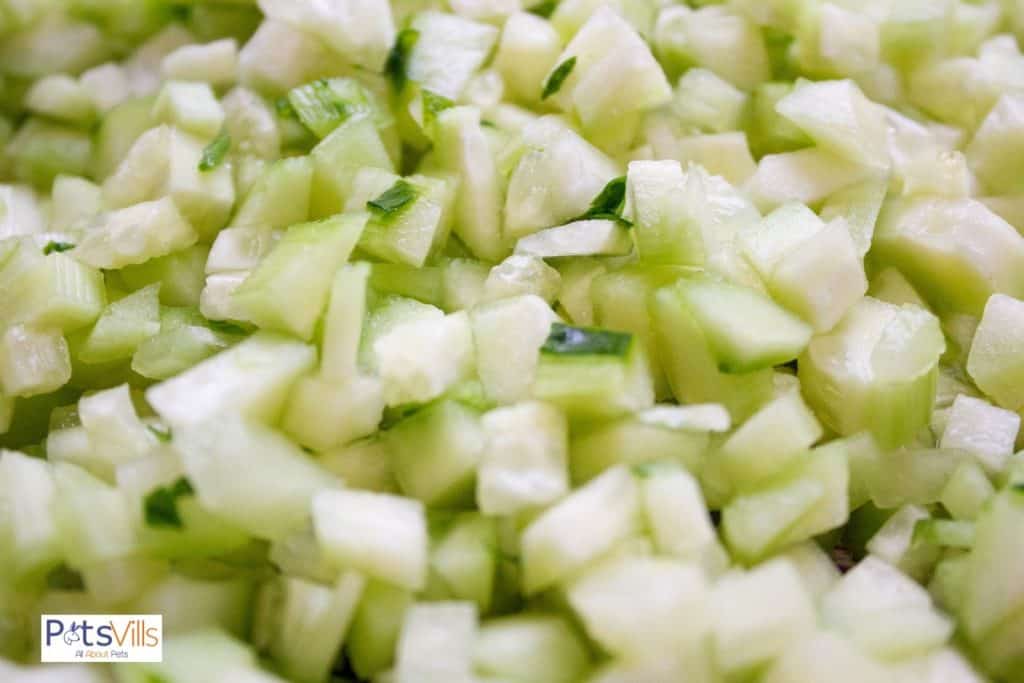
- First, choose fresh cucumbers for your feathered friends and wash them well. If possible, get organic cucumbers and avoid moldy foods.
- Cut the cucumber in half and place it on the feeder with the flesh facing upward so the chickens can peck at the flesh and seeds of the cucumber.
- Chop the cucumber into small pieces. Then mix the pieces with the chicken feeds or place them inside the feeder. I prefer this method because it reduces the risk of choking.
- You can also cook the cucumber to make it soft and easier to digest. But cooking removes many nutrients, so it’s not as good as fresh produce.
- In summer, you can offer your chicken a cold cucumber to keep your flock cool and well-hydrated.
- Always introduce new foods and treats for chickens slowly to avoid digestive problems.
And now, let’s make it clear how many cucumbers are too much for your chickens to eat.
How Much And How Often To Feed Cucumber To Chickens
While cucumbers are a healthy treat for chickens, you should feed them in moderation. 90% of your flock’s nutrients should come from chicken feed and 10% from fruits, veggies, and table scraps.
So, you can give cucumbers a couple of times per week. It won’t hurt your flock even if you provide them with a bit of cucumber daily.
However, cucumbers don’t have all the necessary nutrition that a chicken requires every day. Therefore, you want to ensure your chicks eat their feed daily to stay healthy.
Depending on how large your flocks are, one cucumber for every 5 chickens is enough. Don’t be tempted to increase the portion because your hens can get spoiled.
And I’ve got a few more tips to help you keep your flock healthy and thriving!
3 Extra Tips for Feeding Cucumbers to Chickens
Sometimes, chicken keeping can be harder than most people imagine because it’s easy to upset a chick’s digestive system if you’re not careful.
#1 Avoid Moldy Cucumbers
I’ve seen chicken keepers that give moldy food to their flock. That’s a big mistake because mold can make chickens ill and affect their egg production.
#2 Choose an Organic
It’s always better to feed your chickens organic produce because you don’t have to worry about harsh chemicals.
#3 Be Careful with Pesticides
If you let your chickens roam around the gardens, be careful with pesticides. Your chickens can consume worms and other insects that have been in contact with the pesticides and get sick.
FAQs
1. Can Chickens Eat Raw Cucumbers?
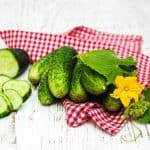
Chickens can eat raw cucumbers because they’re full of essential nutrients, vitamins, and minerals. Raw produce is better for animals than cooked ones.
2. What Vegetables Are Toxic to Chickens?
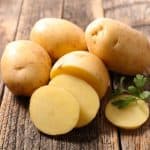
Avoid feeding chickens vegetables from the nightshade family, such as tomatoes, pepper plants, potatoes, and eggplants.
3. Can Chickens Eat Cucumbers with Skin?
Cucumber peels aren’t toxic to chickens, so chickens can eat cucumbers with skin. However, the skin is tough to peck, so it’s better to peel the cucumber and cut it into small pieces.
Conclusion
Can chickens eat cucumbers? Your chicken can eat cucumbers and their skin, seeds, and leaves without suffering side effects.
While cucumbers are safe vegetables for chickens, you should feed them in moderation. Too many cucumbers can lead to digestive problems or interfere with normal egg production.
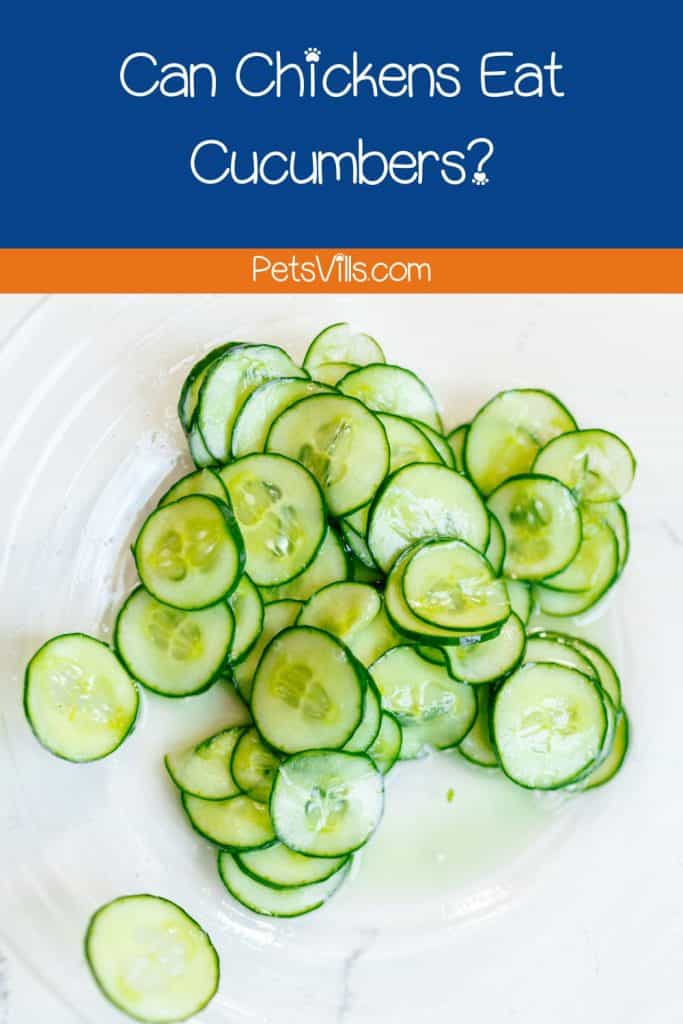
What do you think about this topic? Can chickens eat cucumber? Share your thoughts in the comment section.
Resources:
1. FoodData Central [Internet]. fdc.nal.usda.gov. Available from: https://fdc.nal.usda.gov/fdc-app.html#/food-details/2346406/nutrients
2. How to Care for Chickens | Blog [Internet]. RSPCA Queensland. Available from: https://www.rspcaqld.org.au/blog/pet-care/how-to-care-for-chickens
3. Guelinckx I, Tavoularis G, König J, Morin C, Gharbi H, Gandy J. Contribution of Water from Food and Fluids to Total Water Intake: Analysis of a French and UK Population Surveys. Nutrients. 2016;8:630.
4. McCrea DB. Calcium and Your Flock [Internet]. www.chickenwhisperermagazine.com. Available from: https://www.chickenwhisperermagazine.com/nutrition/calcium-and-your-flock
Grigorina grew up surrounded by animals – dogs, cats, cows, goats, sheep, and horses and that has shaped her into what I am today – a crazy cat lady who always has a place for one more cat (or a dog). She has two female cats – Kitty and Roni, and two tomcats – Blacky and Shaggy, but she also feeds her neighbors’ cats when they come for a visit. I just can’t say no to them. Follow her on FACEBOOK AND INSTAGRAM
Read her latest articles HERE
Learn more about her

